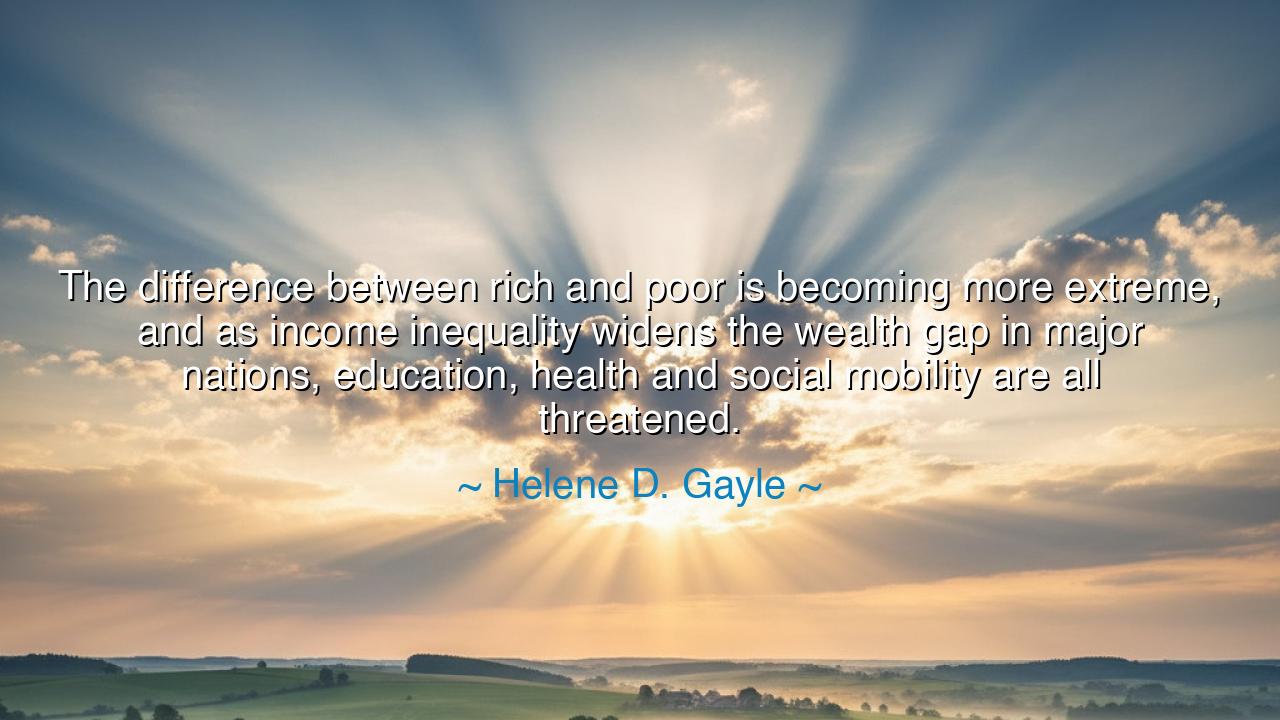
The difference between rich and poor is becoming more extreme
The difference between rich and poor is becoming more extreme, and as income inequality widens the wealth gap in major nations, education, health and social mobility are all threatened.






There are voices in every age that rise to warn humanity when it drifts too far from balance. Among them is Helene D. Gayle, whose words ring with the gravity of both compassion and truth: “The difference between rich and poor is becoming more extreme, and as income inequality widens the wealth gap in major nations, education, health and social mobility are all threatened.” In this statement, she does not merely speak of economics — she speaks of the delicate architecture of civilization itself. For when wealth pools in a few hands while the many struggle to survive, the very foundations of society begin to tremble.
The meaning of this quote lies in its recognition of the invisible threads that bind human progress together. Wealth inequality, though measured in numbers and coins, is not only a financial divide — it is a divide of opportunity, of dignity, of hope. Gayle warns that when this chasm grows too wide, it devours more than money; it consumes the spirit of unity. Education, that noble ladder by which the poor might rise, begins to break. Health, the birthright of all living beings, becomes a privilege for the few. Social mobility, the promise that one’s birth does not determine one’s destiny, fades into myth. Thus, inequality becomes not only an economic failure, but a moral one — a wound to the soul of humankind.
The origin of Gayle’s words springs from her life’s work as a physician, humanitarian, and advocate for global equity. Having served in the realms of public health and international development, she has witnessed firsthand how disparity corrodes the wellbeing of nations. In the villages of Africa, in the streets of America, and in the growing urban centers of the world, she saw the same truth repeated: where inequality reigns, suffering multiplies. Her quote emerges not from theory, but from observation — from the tears of mothers who cannot afford medicine, from the hunger of children who cannot afford education, and from the exhaustion of workers who cannot afford to dream.
History, too, bears witness to this pattern. In the final days of Ancient Rome, the gap between the patricians and the plebeians grew vast. The rich feasted in marble halls while the poor languished in the streets, their cries ignored by those who ruled. Over time, the republic rotted from within — not from invasion, but from inequality. Bread and spectacle could not heal a broken social order. So too, in our age, Gayle reminds us that no empire, however powerful, can stand upon the backs of a divided people. For when the poor lose faith in fairness, and the rich lose sight of mercy, the balance of civilization is lost, and all are diminished.
Yet her words are not only a warning — they are a call to wisdom. Gayle shows us that the path to stability and peace lies not in the concentration of wealth, but in its fair and purposeful use. Education must not be a luxury, but a light in every home. Healthcare must not be a marketplace, but a sanctuary for all. Opportunity must not be inherited, but earned through a system that values effort and compassion alike. The prosperity of a nation is not measured by the gold of the few, but by the wellbeing of the many. To heal the world, the powerful must act with humility, and the powerless must be given the tools to rise.
Consider the tale of Andrew Carnegie, the steel magnate who, after amassing immense wealth, chose to devote his fortune to the public good. He built libraries, schools, and foundations, declaring that “the man who dies rich, dies disgraced.” His transformation from industrial titan to benefactor offers an enduring lesson: wealth, when guided by conscience, becomes not a weapon of division, but an instrument of creation. Gayle’s warning, then, is not against prosperity itself, but against prosperity without purpose. For in the hands of the wise, riches uplift; in the hands of the indifferent, they corrupt.
Thus, the lesson to be drawn from Gayle’s words is clear: justice and compassion must walk hand in hand with progress. The citizens of every nation must demand systems that protect not only markets, but people; not only growth, but fairness. Let the rich remember that their fortunes are bound to the fate of their societies, and let the poor remember that their dignity is unbroken as long as they strive and believe. To heal the widening gap, we must rekindle empathy — the oldest and most sacred wealth of all.
And so, O listener, carry this wisdom forward: when you see inequality, do not turn away. Speak for the voiceless, share with the needy, and build bridges where others build walls. For the strength of humanity lies not in division, but in solidarity. As Helene D. Gayle reminds us, the health of a people, the light of their minds, and the hope in their hearts are the true measures of civilization. Guard them well, for they are treasures that no gold can replace.






AAdministratorAdministrator
Welcome, honored guests. Please leave a comment, we will respond soon